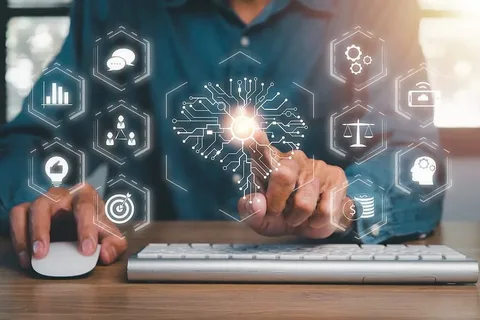Discover the top AI trends in 2025 shaping industries, from generative AI and automation to ethical AI and healthcare innovations.
Introduction
Artificial Intelligence (AI) has rapidly evolved from an emerging technology to a global driver of innovation, efficiency, and transformation. In 2025, AI is no longer just a futuristic concept—it is the backbone of business, healthcare, education, and daily life. From generative AI tools that streamline content creation to advanced automation reshaping industries, organizations worldwide are adapting to stay ahead.
This article explores the top AI trends in 2025, highlighting how they are shaping the future, which industries are most affected, and what individuals and businesses can do to adapt.

1. Generative AI Becomes Mainstream
Generative AI, once limited to text and image creation, has expanded into video production, code development, and product design. In 2025, businesses are using generative AI to:
- Automate marketing content creation.
- Generate realistic training simulations for employees.
- Accelerate product prototyping with AI-driven design.
According to a 2024 Gartner report, over 80% of enterprises are expected to use generative AI by the end of 2025. This integration is not only saving time but also creating new opportunities for creativity and personalization.
2. AI in Healthcare and Biotechnology
Healthcare continues to be one of the biggest beneficiaries of AI. In 2025, AI is transforming patient care through:
- Predictive diagnostics: AI models can now detect early signs of diseases like cancer or Alzheimer’s.
- Drug discovery: Reducing development time by analyzing billions of compounds.
- Personalized medicine: AI tailors treatments to individual patient genetics and history.
For instance, AI-driven drug discovery platforms have shortened research cycles from 10 years to less than 3 years, making life-saving medicines more accessible.
(Related: AI applications in healthcare)
3. AI and Automation in the Workplace
The rise of AI-powered automation is reshaping how businesses operate. By 2025, AI is handling repetitive administrative tasks, freeing up employees for more strategic roles. Key areas include:
- Human resources: Automated resume screening and onboarding.
- Customer support: AI chatbots providing 24/7 multilingual service.
- Finance: Fraud detection and automated bookkeeping.
A McKinsey study suggests that AI could contribute $4.4 trillion annually to the global economy by streamlining workflows and increasing productivity.
(Related: Best AI tools for business)
4. AI and Cybersecurity
With cyberattacks growing more sophisticated, AI is playing a central role in cyber defense. In 2025, businesses are adopting AI tools to:
- Detect unusual network behavior in real time.
- Automate threat response.
- Use predictive analytics to anticipate potential breaches.
However, the same AI advancements are also being exploited by hackers to create AI-driven malware. This arms race makes cybersecurity one of the most critical AI battlegrounds of 2025.
5. Ethical AI and Regulation
As AI becomes more powerful, ethical concerns are front and center. Governments and organizations are increasingly focused on:
- AI bias reduction to ensure fairness in decision-making.
- Transparent AI models for explainability.
- Global AI regulations to ensure accountability.
The European Union’s AI Act, set to take full effect in 2025, will serve as a global framework for regulating AI applications, particularly in healthcare, finance, and law enforcement.
(Related: How to start AI research projects)
6. AI-Powered Education
Education is being redefined with the help of AI. Personalized learning platforms are adapting to each student’s pace, strengths, and weaknesses. In 2025, we’re seeing:
- AI tutors providing real-time assistance.
- Adaptive testing that changes difficulty based on student performance.
- Immersive learning with AI-powered VR classrooms.
By enhancing engagement and accessibility, AI is helping bridge global education gaps.
7. The Rise of AI-Powered Creativity
Creativity, once considered uniquely human, is being redefined by AI. In 2025, AI is:
- Composing music tailored to user preferences.
- Designing fashion collections with predictive trend analysis.
- Creating films and animations with minimal human intervention.
While some fear AI may replace human artists, the reality is more about collaboration, where AI serves as a creative partner.
8. AI in Sustainability and Climate Action
AI is playing a vital role in addressing climate change. Some of the biggest impacts in 2025 include:
- Smart grids optimizing renewable energy distribution.
- AI-powered climate modeling to predict natural disasters.
- Precision agriculture reducing waste and increasing crop yields.
For example, AI-driven irrigation systems have already helped farmers reduce water usage by up to 30% while increasing yields.
9. AI and the Future of Work
With the rise of AI, the job market is undergoing a massive transformation. While certain jobs are being automated, new AI-related roles are emerging. In 2025, demand is growing for:
- AI ethics specialists
- Prompt engineers for generative AI tools
- Data governance experts
Instead of eliminating jobs, AI is creating a shift in skill demand, emphasizing critical thinking, creativity, and emotional intelligence.
10. The Expansion of Edge AI
Edge AI, where data is processed closer to the source (like smartphones, IoT devices, or sensors), is gaining momentum in 2025. Benefits include:
- Faster response times.
- Reduced reliance on cloud computing.
- Enhanced data privacy.
This is particularly important for industries like healthcare and finance, where real-time decision-making is critical.

Conclusion
The AI landscape in 2025 is dynamic, transformative, and filled with opportunities. From generative AI creativity to healthcare breakthroughs and ethical regulations, artificial intelligence is reshaping nearly every aspect of our lives.
Businesses that embrace these trends will remain competitive, while individuals who upskill in AI-related fields will thrive in the future job market.
As AI continues to evolve, the key lies in striking the right balance between innovation, ethics, and human collaboration.
Final Call to Action
Are you ready to harness the power of AI in 2025? Stay informed, explore new AI tools, and prepare for a future where human intelligence and artificial intelligence work hand in hand.
✅ Internal Links Suggested:
✅ External Links Suggested: